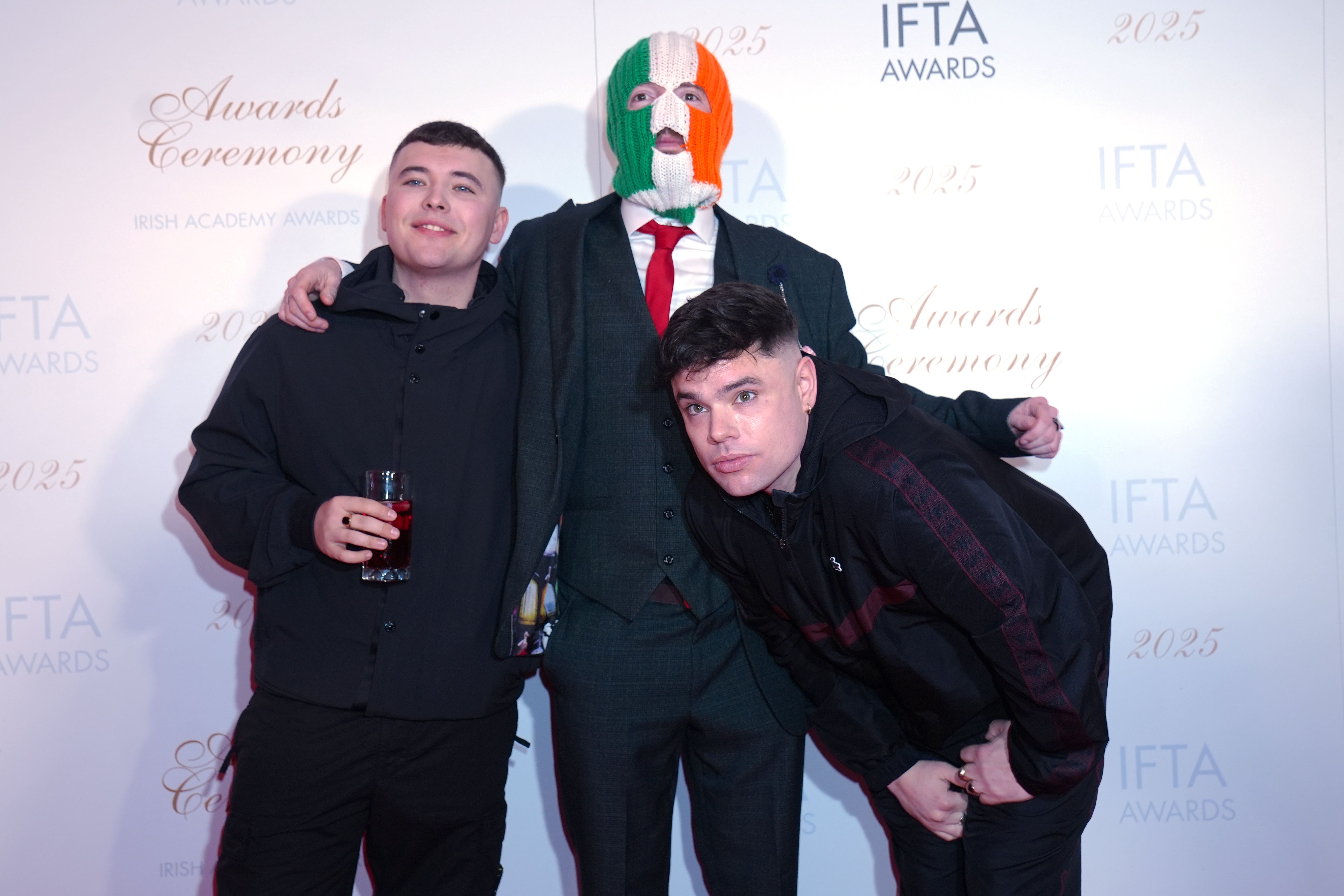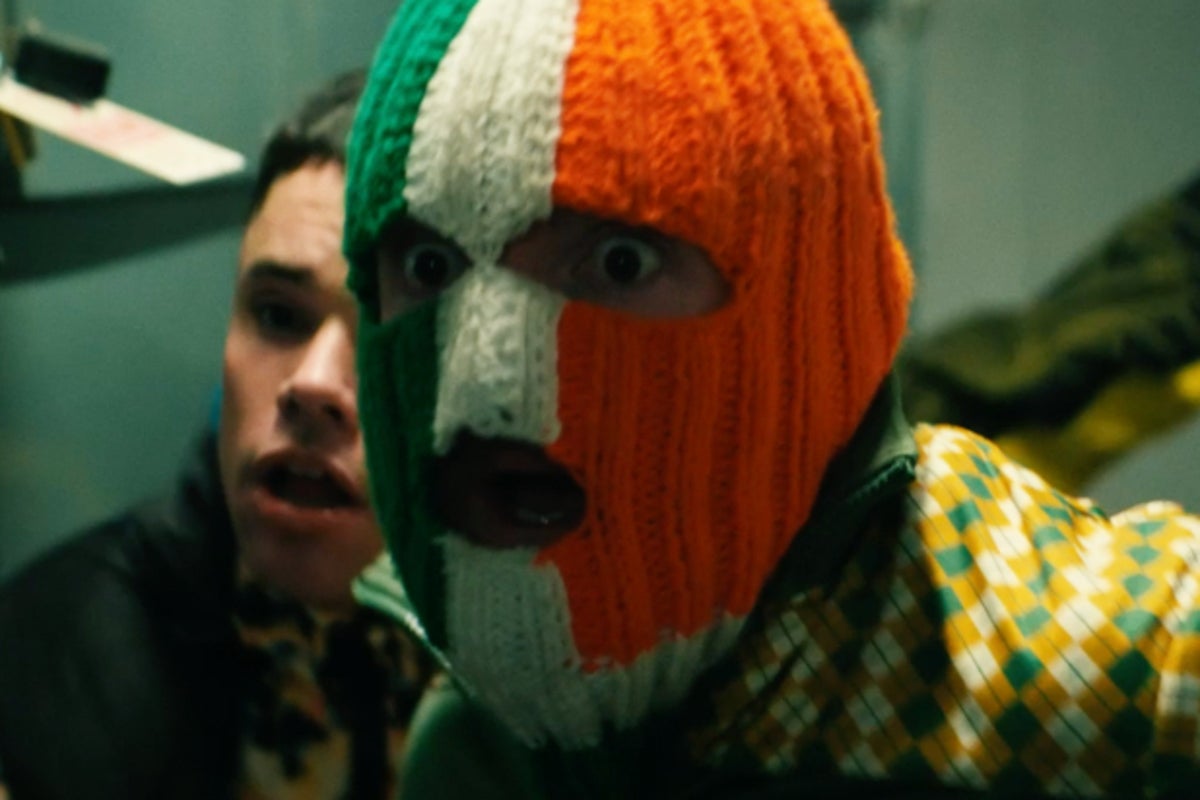At Glastonbury Festival’s Apocalypse Museum, an art installation slash testament to the world’s current woes, images of Gazan destruction are broadcast on TV sets, while an enormous sign transforms the Shell oil logo into the word “hell”. Over on the Pyramid Stage, meanwhile, Matty Healy of The 1975 uses his set to proclaim the value of keeping politically schtum. “You can go out into the world and there’s loads of politics everywhere,” he said. “We don’t need more politics. We need more love and friendship.” In the crowd, the moment is met by light whoops. Many seem to wince.
This is the strange paradox of Glastonbury Festival, where anger, protest and political action sit geographically parallel to gak, hedonism and the allure of doing and thinking absolutely nothing. And then there’s Kneecap, an Irish hip-hop trio who’ve come to exemplify this very split (or is it a contradiction?), their presence at this year’s Glastonbury – in the face of mounting criticism from across the political spectrum – an unexpected referendum on the festival’s soul. That they haven’t been banned from performing is proof that there’s still life in this old girl yet.
Kneecap were arguably popularised in 2024, when they played themselves in an acclaimed semi-accurate biopic (in which Michael Fassbender played one of their dads, a former republican paramilitary). But many more will have likely only heard of them in the last few months, now that they are – to quote The Times – “the most controversial band in music since the Sex Pistols”. And with that they bring to Glastonbury a degree of anti-establishment rage that has always underpinned the festival, but which in recent years has played more of a cameo role when it comes to the actual line-up of acts.
Kneecap are, regardless of where you stand on that aforementioned controversy, the perfect Glastonbury band: a trio of men who spit bars about substance use and partying, as well as colonialism, sectarian violence and the scourge of political apathy. They rap in Irish as a form of reclamation against the English, something that has previously put them in the crosshairs of Kemi Badenoch, who in 2023 blocked them from receiving a government-funded music grant due to their politics (this was later found to be unlawful, and the band donated the resulting money to charity.)
Kneecap’s music remains anarchic and free-wheeling, full of chugging techno, wit and rage. In recent months their attention has turned to the Israel and Palestine war, the band playing in front of screens reading “F*** Israel” and “Israel is committing genocide against the Palestinian people” during their April Coachella set (on social media, Sharon Osbourne, OF ALL PEOPLE, called for them to be banned from America). They have also argued that the recent negative headlines they’ve generated, and their ongoing legal battles, are politically motivated theatre. This includes the resurfacing of past concert videos in which the band are seen saying “the only good Tory is a dead Tory” and “kill your MP”. (In an interview published Friday, the band said these were jokes, some provocative, if-you-know-you-know stage riffing rather than a literal call to murder.) “14,000 babies are about to die of starvation in Gaza, with food sent by the world sitting on the other side of a wall, and once again the British establishment is focused on us,” the band wrote in a statement in June.
Despite calls for the band to be dropped from Glastonbury, festival organiser Emily Eavis has continued to support Kneecap’s presence here, while her father Michael responded to the question of whether Glastonbury still stands for something with blunt candour this week: “Oh heaven’s above, yes, of course it does. And I think the people that come here are into all those things. People that don’t agree with the politics of the event can go somewhere else.”
And that feels historically in keeping with a festival that, even with the ever-evolving significance of commercial support for the event, has always embodied leftist politics and leftist causes, from its long-time support for the Campaign for Nuclear Disarmament, as well as environmental and social causes, to the eternal presence of Billy Bragg, who each and every year will be somewhere talking here. And then there are the performers – the anti-Healys, I suppose – who’ve used their sets to make political statements. Blur condemned the Brexit result mid-performance in 2016. Stormzy got his Pyramid crowd to chant “f*** Boris” in 2019. In 2022, Billie Eilish and Phoebe Bridgers were among the US acts who used their sets to express dismay at the then-fresh overturning of America’s constitutional right to abortion. And the event famously had Jeremy Corbyn introduce Run the Jewels in 2017, but not before willing the Pyramid Stage crowd into a socialist battle-cry.

Impossible not to notice this year, too, are the “Free Palestine” flags being waved through crowds this year, along with the keffiyehs slung on necks and the watermelon pins and clutch bags. An installation by the activist collective Led by Donkeys, unveiled on site this week, imagines the likes of Starmer, Elon Musk and JK Rowling being blasted off the planet and straight to Mars. In his Q&A at the site’s Pilton Palais cinema on Thursday, Andrew Garfield railed against “soulless oligarchs who don’t give a f*** about us”. Here, the boogeymen are cut-and-dry, if never quite the focus.
At the Apocalypse Museum, festival-goers emerge shellshocked, while others avoid it entirely. “It’s obviously depressing, but I’m glad it’s here,” says Izzy, a council worker from Leicester, who was on her way to see the campy Irish belter CMAT when she and her partner ventured inside the Museum. “It needs to be here.” Others avoid it entirely. “Nah, not for me,” REMARKS one person scuttling by.
Enjoy unlimited access to 100 million ad-free songs and podcasts with Amazon Music
Sign up now for a 30-day free trial. Terms apply.
Try for free
ADVERTISEMENT. If you sign up to this service we will earn commission. This revenue helps to fund journalism across The Independent.
Enjoy unlimited access to 100 million ad-free songs and podcasts with Amazon Music
Sign up now for a 30-day free trial. Terms apply.
Try for free
ADVERTISEMENT. If you sign up to this service we will earn commission. This revenue helps to fund journalism across The Independent.
Jack, a student from Leeds, is another Museum attendee and is excited for Kneecap’s set. “They’re what Glastonbury is all about,“ he tells me. “It’s about speaking truth to power, it’s about giving a f***.”
And the prevailing mood, noticeable even to the least right-on types here, is hope. Introducing a secret set by Lorde on Friday morning, an elderly man who looks uncannily like Gandalf walks onto stage in a Free Palestine T-shirt, and tells the gathered crowd that this is his 42nd Glastonbury. “There’s so much s*** going on in the world, so let’s make this a peaceful event,” he urges the crowd. “And hopefully that peace will spread to the world.” Everyone around me whoops and cheers in agreement. Marijuana wafts through the air. Then the dancing starts.



